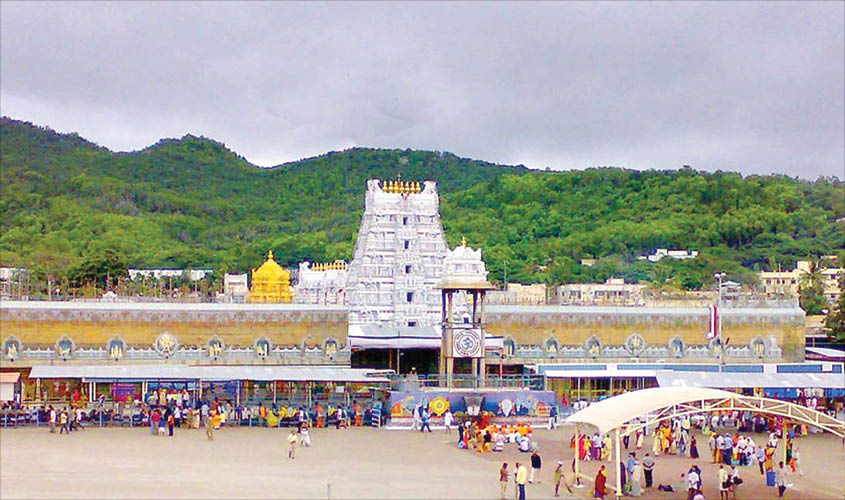‘If churches and mosques are not under government control, why only temples?’
New Delhi: Amidst controversy over the use of temple gold to deal with the Covid-19 pandemic situation, there is strong demand to free the Hindu religious trusts from government control, as is the case with Muslim and Christian religious trusts.
While the state governments control over 4 lakh out of an estimated 9 lakh temples across the country, there is no such control over Muslim and Christian religious bodies. In this backdrop, there are demands to amend “The Hindu Religious and Charitable Endowments (HRCE) Act 1951”, which allows the state governments to take over temples and maintain complete control over them and their properties.
Sources said there are over 15 state governments which control only Hindu religious institutions, specifically temples—right from the appointment of administrators to mandatory collection of 13-18% service charge. This takes away the community’s right and resources to protect its interests. This, according to them, is discriminatory as only Hindu community suffers this kind of treatment. It violates the concept of secularism. Also, the Indian Constitution does not permit the State to run religious institutions.
Those advocating for equality say that the process of taking control of temple riches was started by the Mughals and was followed by the British rulers. After Independence, the Jawaharlal Nehru government continued with the policy of controlling the temples by enacting the HRCE Act in 1951. “To the contrary, there is no such control over mosques and churches. We demand that in the same way, temples should also be freed from any kind of control. The government must amend the Act, which is the root cause of the problem,” said J. Sai Deepak, noted Supreme Court lawyer. He also pointed out that traditionally also the “Raja” (king) does not have the right over the wealth of the temple.
Interestingly, the Supreme Court, in at least three landmark judgments, has asked state governments to hand over religious institutions to the community. However, this has not happened till now. At present, there are two petitions pending before the Supreme Court in this regard.
The recent controversy erupted after senior Congress leader and former Maharashtra Chief Minister Prithviraj Chavan said the government must immediately appropriate all the gold lying with all the religious trusts in the country, worth at least $1 trillion, which can be used to deal with the crisis in the wake of the Covid-19 pandemic. The gold, he said, can be borrowed through gold bonds at a low interest rate. Though he used the word “all the religious trusts”, it was primarily aimed at temples (of Hindus and Jains) and gurudwaras (Sikhs) as only these receive gold as offerings.
Recently, there have also been attempts to acquire the Chandi Mata Temple and the Durga Mata Temple at Banbhuri village in Hisar district by the Haryana government. In Beri (Rohtak), a similar decision was made by the government to acquire the temple which was withdrawn after protest from the local Hindu community and the Vishwa Hindu Parishad (VHP).
Vinod Bansal, national spokesperson of the VHP, said the Indian Constitution mandates that no discrimination would be done on the ground of religion. “But there is discrimination when it comes to controlling the religious trusts. I think the historical mistake done by the British and subsequently by the Nehru government needs to be corrected now. Hindu religious trusts should be treated at par with Muslim and Christian religious trusts,” he added.
Explaining the legal aspect of the issue, Deepak said: “Trust is a legal entity. The gold or wealth offered to the deity is object of worship and reverence. In fact, even the gold monetisation scheme is a fraud as nobody has the right to surrender it to anyone under any scheme. Any scheme seeking to take over such objects of worship is in violation of Articles 25 and 26 of the Indian Constitution. In any case, the Constitution says that no one has the right to touch religious autonomy. ”
Asked about the gold monetisation schemes, Deepak said these are largely the product of State control of temples. “Temples are coerced by the state governments to monetise their gold against their will. The root cause of this issue is state control of temples, which is unconstitutional and discriminatory. Any scheme which does not translate to the principal being returned in gold is a loss to the community,” he said.
According to sources, most of the temples in South India are under the control of state governments. In Andhra Pradesh, the state government has taken control of about 34,000 temples.
The famous Tirupati Balaji temple got Rs 3,500 crore as donation, but only 7% is spent on its management. Many of the artifacts were found being sold in the UK market.
Bansal asked if India is a secular nation, then Hindu temples should be considered at par with mosques and churches.
If churches and mosques are not under government control, why only temples, he asked.

